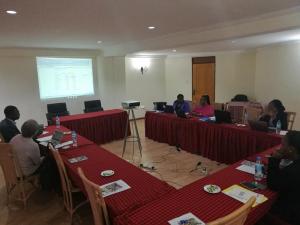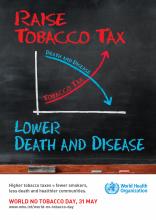Raising taxes on tobacco: good for health, good for economies
Arusha, 23-26 October 2017: Tobacco use is one of the leading preventable causes of death, killing more than 7 million people every year. More than its enormous toll of disease, suffering, and death, tobacco use also burdens the global economy with an estimated US$ 1.4 trillion in healthcare costs and lost productivity each year.
To help monitor and control the epidemic, taxing and pricing policies have been widely recognized to be one of the most effective means of influencing the demand for and thus the consumption of tobacco products.
Implementation of Article 6 of the WHO Framework Convention on Tobacco Control (WHO FCTC) is an essential element of tobacco-control policies and thereby efforts to improve public health. Increasing the price of tobacco through higher taxes is the single most effective way to encourage tobacco users to quit and prevent children from starting to smoke. For this reason, higher tobacco taxes are referred to as 'win-win' policies because they generate extra government revenue while at the same time reduce long-term tobacco consumption.
Many low income countries have the opportunity to substantially increase their tax revenues from tobacco products. The share of total taxes in the price of a pack of cigarettes in Tanzania is 43%. WHO FCTC recommends that tobacco taxes to be implemented through an appropriate tax structure and increase steadily to reach at least 75% of the retail price so as to have a significant impact on consumption reduction and revenues increase.
To that end, WHO supported the country to examine the tobacco market and the existing excise tax system to determine how to increase the efficiency and the effectiveness of the excise system. This was done through a four-days training workshop for officials from the Tanzania Revenue Authority (TRA), Customs, the Ministry of Finance and Planning (MoFP), the Ministry of Health and WHO Country Office.
During the workshop, participants with support of WHO facilitators
- assessed the current tax system for tobacco products in Tanzania
- examined the means of improving the efficiency and effectiveness of the tobacco tax systems; and
- explored options for generating sustainable higher revenues
The WHO Tax Simulation Model (WHO TaXSiM) was used to analyse very detailed information and data on the import quantity, value added tax, retail price, tax rates and revenues for cigarette and other tobacco products for an extended period of time.
Using the WHO tax simulation model, three different scenarios were tested producing estimates on the impact of planned changes in the tobacco tax policy on the revenue, import and domestic sale of tobacco products.The workshop has contributed to strengthened country capacity to analyze the tobacco market, identify gaps in the tax system on tobacco products and propose stronger tax administration.
The United Republic of Tanzania has ratified the WHO Framework Convention on Tobacco Control (WHO FCTC) which urges countries to implement tax and price measures as part of a comprehensive tobacco-control strategy in line with other articles of the WHO FCTC.





